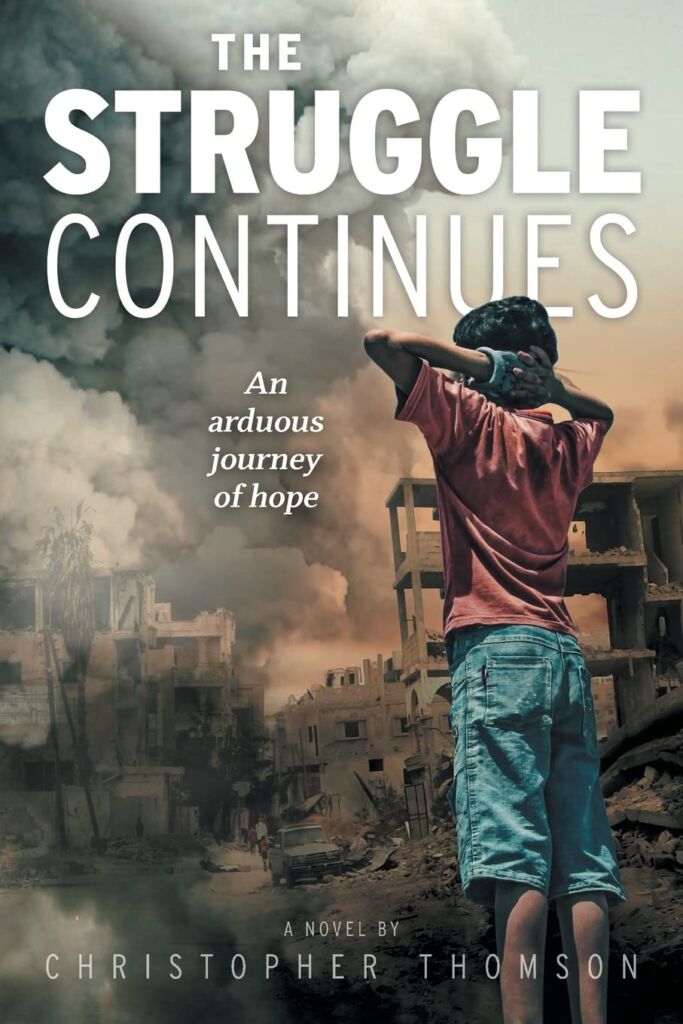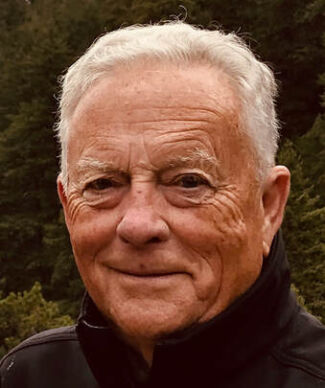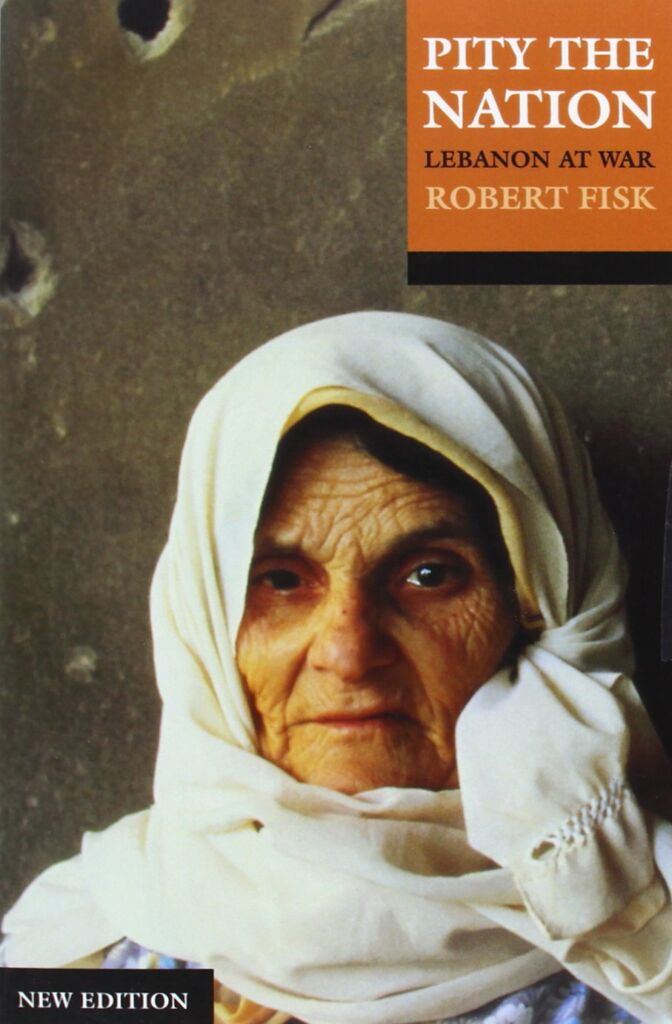Capturing ‘Lebanon’s enduring nightmare’
The Struggle Continues: An arduous journey of hope
by Christopher Thomson
Victoria: FriesenPress, 2023
$19.49 / 9781039157613
Reviewed by Larry Hannant
*

I don’t know when you’ll read this. But I predict that when you do, news media will almost certainly feature some catastrophe from West Asia.
Where? You ask because we’re still locked into the terminology – and the chaos – set down by British colonial officials at a time when the sun never set on the swathe of English conceit known as the British Empire. The empire knew the region as the Middle East.
Back when they coined that idiosyncratic phrase, just over a century and a half ago, even a determined observer of world news would have seen little about that quiet region. European imperial attention then was still mainly focused on the scramble to secure new colonies in Africa.
How that would change in the early 20th century! Scott Anderson’s memorable Lawrence in Arabia (Signal, 2013) delves into the plethora of imperial agents, in addition to T. E. Lawrence, who were prowling around Arabia (or, more specifically, Palestine) just before the First World War. Proxies working for Britain, Germany, and the U.S. crossed paths with those from the reigning empire, the Ottomans, and those conspiring in the name of the emerging ideology of Zionism.

Everyone with an agenda! And pity the Palestinians. They could trace their ancestry on the land back almost four thousand years to the Canaanites, but their indigenous possession mattered nothing in the face of imperial ambitions.
One of the longest-lasting impacts of the multi-state disintegration unleashed by WWI was Britain’s decision to use Zionism as its ticket to winning a foothold in Palestine. From the Christians who had pioneered the plan in the 1840s to the converted Jew Benjamin Disraeli in the 1850s, on to Theodore Herzl, who reignited it in 1896, Zionists had affirmed that their colony in West Asia would be an outpost of Europe, specifically Britain. In November 1917, with the Balfour Declaration, the British cabinet officially anointed Zionism as its preferred agent of colonization, counting on the gesture to bring European Jews onto its side in the desperate fight against Germany that Russia had recently abandoned.
For thirty years, the Zionist colony served in that capacity, although by the mid-1940s Britain was beginning to feel like a dog that was being wagged – violently – by its tail. Soon the U.S. would take over as imperial enforcer. These days, it, too, must be wondering if it’s being jerked around by Tel Aviv.

Thus, for a century, West Asia has been a maelstrom centering on the state that’s distinguished by being the only “democracy” – although consider about how much more insight comes from substituting the descriptor “colony” – in the region. Christopher Thomson’s title captures the scene well: The Struggle Continues.
Subtitling his novel An arduous journey of hope, the former Canadian diplomat, now retired in Vancouver, walks a secondary road through the chaos. He follows the clash among competing political and military powers and diverse religious groups in Lebanon. One almost couldn’t find a more perfect recipe for instability. Still, despite occupation by France for 30 years after WWI, Orthodox and Maronite Christians, Sunni and Shia Muslims and Druze, among other groups and ethnicities, patched together a working government and social structure in the country.
The destabilizing factor was the creation in 1948 of Israel, whose warriors expelled over 100,000 Palestinians to Lebanon (a small portion of the 750,000 driven from their homes across Palestine). Thrown into an existing population of just over one million, the Palestinians inadvertently stressed the political and social balance that Lebanon had patched together.
Thomson casts a fictional net over the special hell of the Palestinian refugee camps in Lebanon in the 1970s and early 1980s. When it became clear that United Nations resolutions and diplomacy would not convince Israel to allow refugees to return and when even more Palestinians were jammed into Lebanon in the 1967 war, the Palestinians took to military action. Cross-border raids escalated, pitting the Israeli military against Palestine Liberation Organization (PLO) units. Inevitably, civilians were frequent victims.

As the PLO strengthened and established a quasi-government in southern Lebanon, conservative Maronite Christians became increasingly alarmed, creating paramilitary militias allied with and armed by Israel. Open violence broke out in 1975, and Lebanon was consumed by civil war and invasion right through to 1990. Over 150,000 people were killed, including over 3000 in the Palestinian refugee camps of Shatila and Sabra. The invading Israeli army surrounded the camps and admitted Christian militias to carry out a mass slaughter.
In Pity the Nation, the artful English journalist Robert Fisk captured Lebanon’s enduring nightmare in just less than 700 pages of dense reportage featuring hundreds of characters and striking vignettes.
Pity the novelist who attempts the same in 269 pages. A work on the scale of War and Peace might be too brief. Too often The Struggle Continues leaves the reader seeking more, yearning to see personal motivation and insightful backstory.
Another disconcerting aspect is that Thomson cannot escape the diplomat’s style. No doubt it served him well in his thirty-two-year career. But it does grate, for example, to hear the words of a teenaged Palestinian boy whose mother has been the victim of a revenge assassination: “I can hardly bear the pain of the loss, Grandfather, but I so appreciate the care you are providing me.” And his grandfather replies with similar formality.
Former Canadian diplomats, like retired security intelligence professionals in this country, are remarkably reticent to pen tell-all memoirs about the shit and shenanigans they witnessed throughout their careers. With years of service in West and East Asia and at the United Nations, Thomson must have had his breath taken away more than once by the diplomatic games he witnessed.
Written by a Western diplomat willing to name names, a factual account of the tragedy of Lebanon and the Palestinians who were driven into that country’s wary arms by a European colonial proxy state has the potential to be a coup. As a novel, The Struggle Continues, even with the best of intentions to convey the horror of that trauma, is a bit of an arduous journey.
*

Larry Hannant is the author of All My Politics Are Poetry (Victoria: Yalla Press, 2019, reviewed here by Natalie Lang). His most recent book is an edited collection titled Bucking Conservatism: Alternative Stories of Alberta in the 1960s and 1970s (Athabasca University Press, 2021). Hannant taught aspects of human rights history for years at BC universities and colleges and is engaged in writing an anti-imperialist history of human rights. He lives in Victoria. [Editor’s note: Larry Hannant has recently reviewed books by Grand Chief Ronald M. Derrickson, David Spaner, Pitman Potter, Suchetana Chattopadhyay, Eve Lazarus, and Christabelle Sethna & Steve Hewitt for The British Columbia Review, and he has contributed three essays, ChatGPT and me, I’m not your man: Norman Bethune & women, and Letter from Victoria.]
*
The British Columbia Review
Interim Editors, 2023-25: Trevor Marc Hughes (non-fiction), Brett Josef Grubisic (fiction and poetry)
Publisher: Richard Mackie
Formerly The Ormsby Review, The British Columbia Review is an online book review and journal service for BC writers and readers. The Advisory Board now consists of Jean Barman, Wade Davis, Robin Fisher, Barry Gough, Hugh Johnston, Kathy Mezei, Patricia Roy, Maria Tippett, and Graeme Wynn. Provincial Government Patron (since September 2018): Creative BC. Honorary Patron: Yosef Wosk. Scholarly Patron: SFU Graduate Liberal Studies. The British Columbia Review was founded in 2016 by Richard Mackie and Alan Twigg.
“Only connect.” – E.M. Forster
One comment on “Capturing ‘Lebanon’s enduring nightmare’”